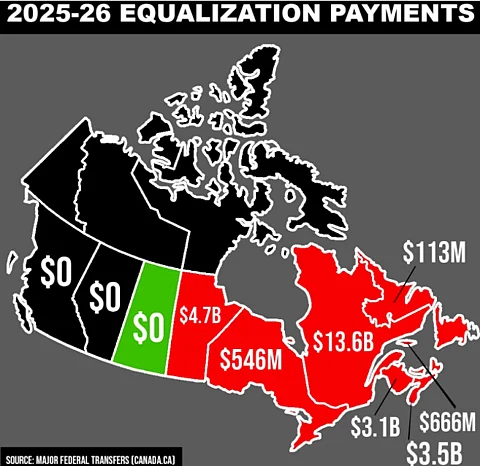Quebec gets $13.6 billion in transfer payments, West gets zero in 2025
The Government of Canada has announced Quebec will get $13.6 billion in transfer payments in 2025-2026 and the West will get zero.
Quebec received $14 billion in equalization payments in 2023-2024 — total transfers to Quebec rounded to $28.652 billion, which includes the Canada Health Transfer, Canada Social Transfer, and Equalization payments.
Over the years, Alberta has been one of the largest contributors to federal revenue due to its high-income residents and robust corporate tax base, largely connected to oil and gas.
Alberta does not receive equalization payments because its financial heft exceeds the national average.
The imbalance leads to a perception that Alberta is disproportionately funding other provinces — especially when considering the significant amounts like $240 billion over 11 years sent to Ottawa but not returned in equal measure to Alberta.
"Equalization holds Alberta back and encourages dysfunctional policies that stifle growth in other provinces," Alberta Premier Danielle Smith said earlier in 2024 on X.
"The Equalization and Federal Transfer system are broken and must be entirely overhauled."
Quebec politicians often argue the province is entitled to transfer payments based on Canada's equalization formula, which is designed to ensure all Canadians can receive comparable public services regardless of where they live.
While some Quebecers have expressed a desire for less dependence on federal transfers, there's also a pragmatic acceptance of these funds as part of the federal system.
Former Premier Bernard Landry once described receiving equalization as "degrading."
"I want Quebec to become an economic locomotive, not just a province that lives off transfers," said Quebec Premier François Legault in 2018.
"Our goal should be to reduce, if not eliminate, our dependence on equalization."


